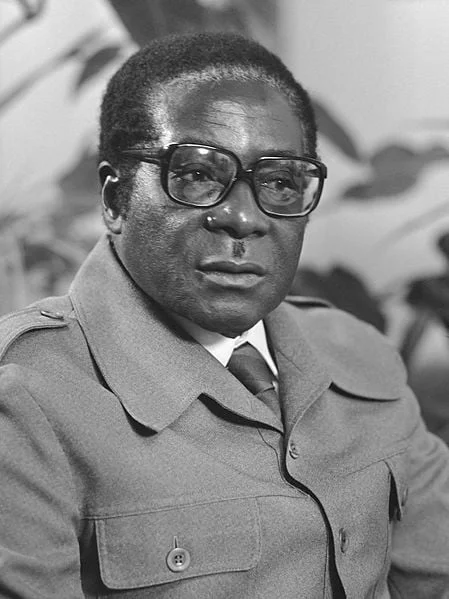Real Celebrities Never Die!
OR
Search For Past Celebrities Whose Birthday You Share

source:wikipedia.org
Robert Mugabe
Birthday:
21 Feb, 1924
Date of Death:
06 Sep, 2019
Cause of death:
cancer
Nationality:
Zimbabwean
Famous As:
Poltician
Age at the time of death:
95
Robert Mugabe's Quote's
Early Life and Education
Robert Mugabe was born on February 21, 1924, in Kutama, Southern Rhodesia (now Zimbabwe). Growing up in a Catholic mission, he received his early education before moving to South Africa for higher studies. In 1952, Mugabe earned a Bachelor of Arts degree at the University of Fort Hare, where he encountered anti-colonial activism, laying the foundation for his political beliefs.
Early Career and Influences
Returning to Southern Rhodesia, Mugabe taught in Ghana and Tanzania, where he became influenced by nationalist movements. In 1963, he joined the Zimbabwe African National Union (ZANU), a political party advocating for black majority rule. As tensions escalated, Mugabe was arrested in 1964 for his involvement in anti-government activities, leading to an 11-year imprisonment.
Road to Independence
Released in 1974, Mugabe intensified his efforts for Zimbabwean independence. The Lancaster House Agreement in 1979 paved the way for elections, resulting in Mugabe becoming Prime Minister in 1980. This marked the end of white-minority rule and the birth of independent Zimbabwe.
Early Leadership and Achievements
Mugabe’s early years in power showed promise, with improvements in education and healthcare. These reforms were initially well-received and aimed at addressing inequalities created by colonial rule.
Controversial Policies and Challenges
However, Mugabe’s leadership took a controversial turn. In the 1990s, his government faced allegations of human rights abuses and political violence. The contentious land reform program, beginning in 2000, aimed to address historical injustices but resulted in economic decline and international criticism.
Consolidation of Power
Despite criticism, Robert Mugabe maintained a strong grip on power. In 1987, he became the Executive President, consolidating authority. The 2008 elections, marred by violence and accusations of rigging, led to a power-sharing agreement, with Mugabe remaining president.
Resignation and Later Years
On November 21, 2017, amid political turmoil and pressure from the military, Mugabe resigned, ending his 37-year rule. He passed away on September 6, 2019, in Singapore, leaving a complex legacy.
Legacy and Impact
Mugabe’s life reflects the complexities of African post-colonial politics, with early promise overshadowed by controversial decisions. His legacy remains a subject of debate, reflecting the intricate interplay between liberation, governance, and personal ambition in the narrative of modern African leadership.
Name:
Robert Mugabe
Popular Name:
Robert Mugabe
Gender:
Male
Cause of Death:
cancer
Spouse:
Place of Birth:
Kutama, Southern Rhodesia (now Zimbabwe)
Place of Death:
Singapore
Occupation / Profession:
Personality Type
Architect: He was good at strategic leadership, strong will, and focus on long-term goals. His ability to articulate a vision for Zimbabwe and rally people toward it suggests qualities of a decisive and visionary leader.
Before becoming a political leader, Mugabe was involved in anti-colonial and nationalist movements. His activism against British colonial rule in Southern Rhodesia led to his imprisonment for over a decade.
Initially knighted by Queen Elizabeth II in 1994, Mugabe’s knighthood was revoked by the British government in 2008 due to human rights abuses and the controversial land reform program in Zimbabwe.
Mugabe’s resignation in 2017 marked the end of his political career. His legacy is complex, with supporters acknowledging his role in the liberation of Zimbabwe, while critics point to controversial policies and the economic downturn during his later years.
Mugabe’s tenure as the Prime Minister and later President of Zimbabwe spanned for 37 years, making him one of the longest-serving leaders in African history.
n 1981, Robert Mugabe was nominated for the Nobel Peace Prize for his role in the Lancaster House Agreement, which brought an end to the Rhodesian Bush War and paved the way for the establishment of Zimbabwe.
China-Africa Friendship Award (2014)
Jawaharlal Nehru Award for International Understanding (1990)
Nkomo Award (2000)
